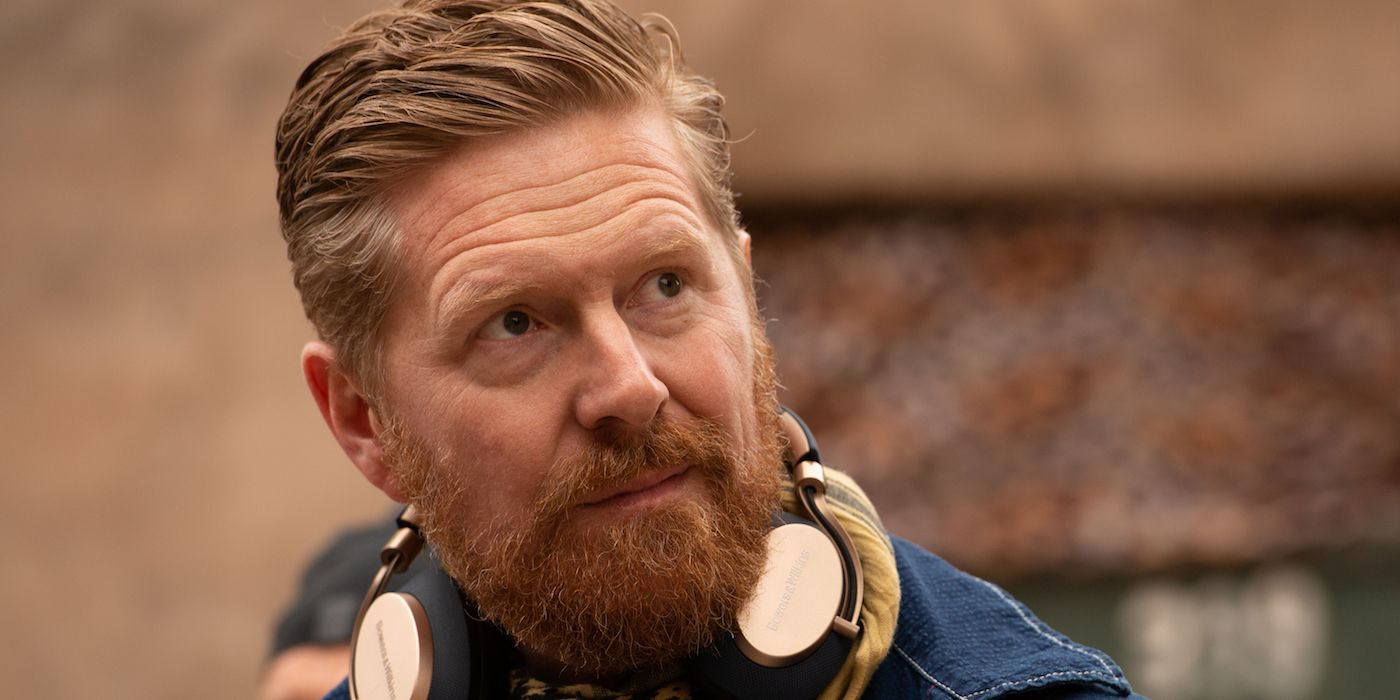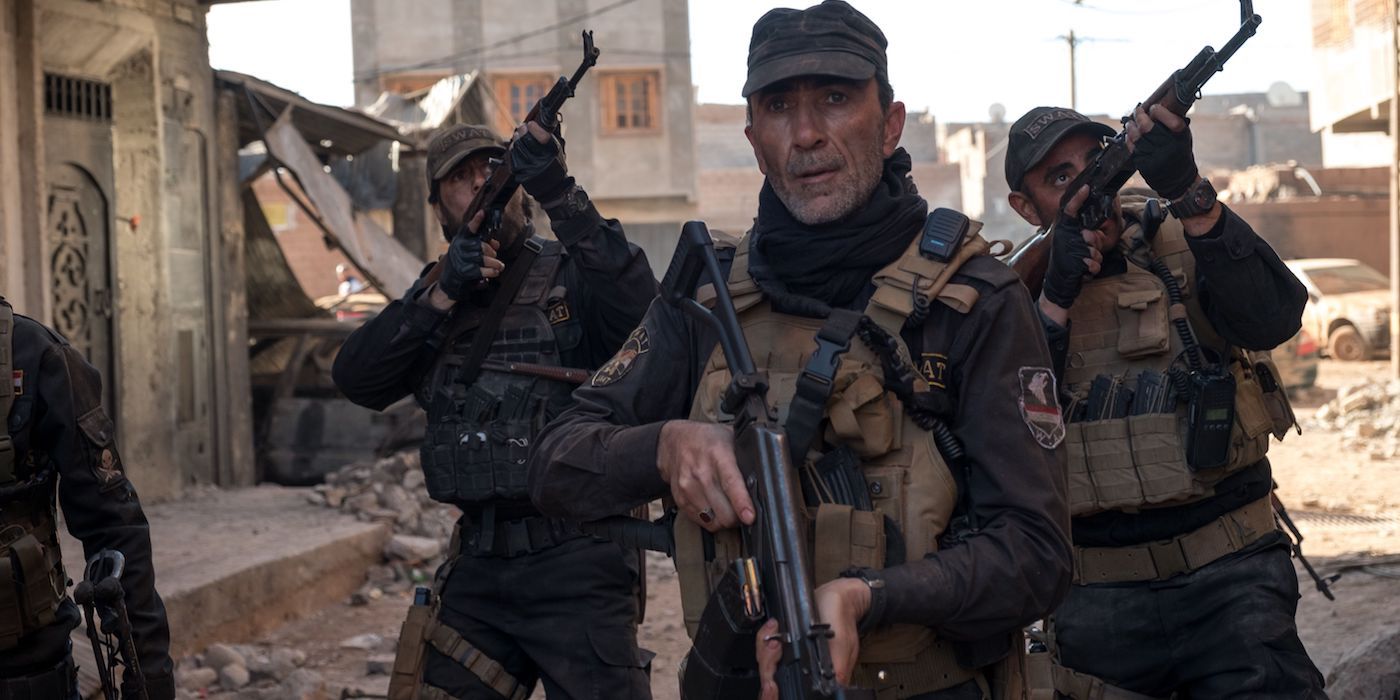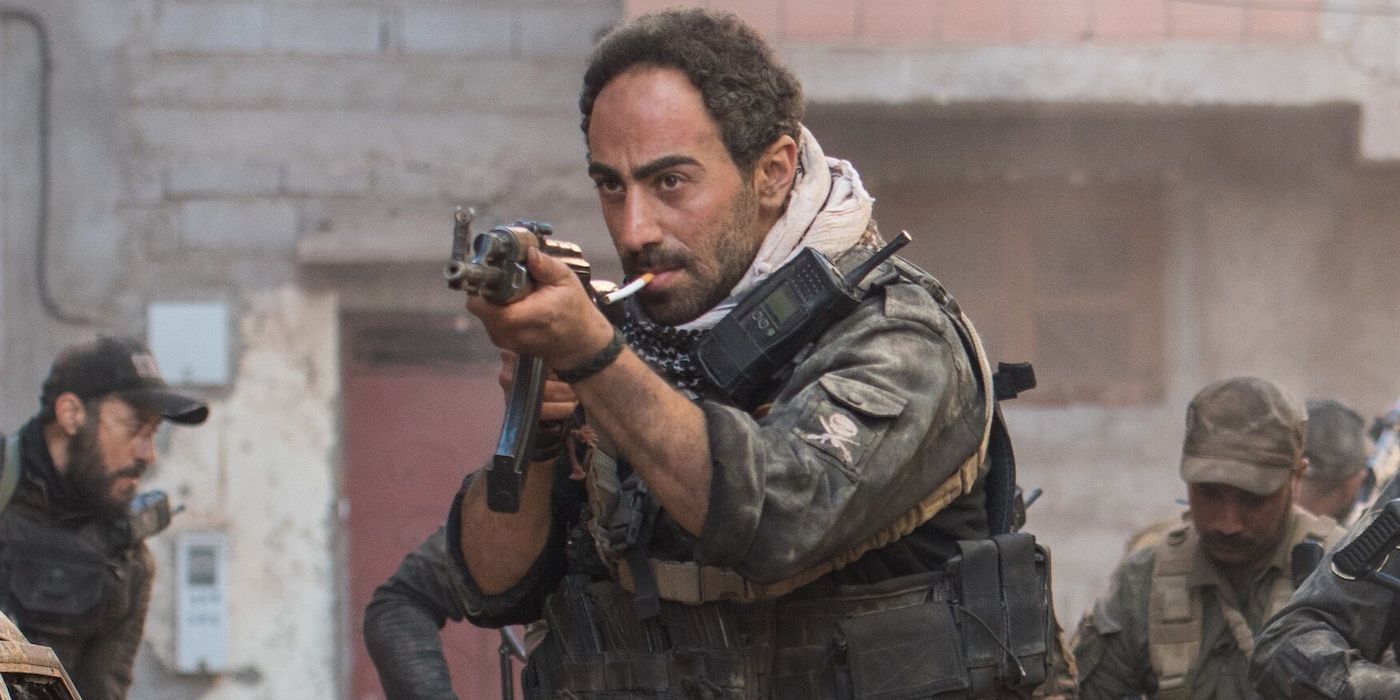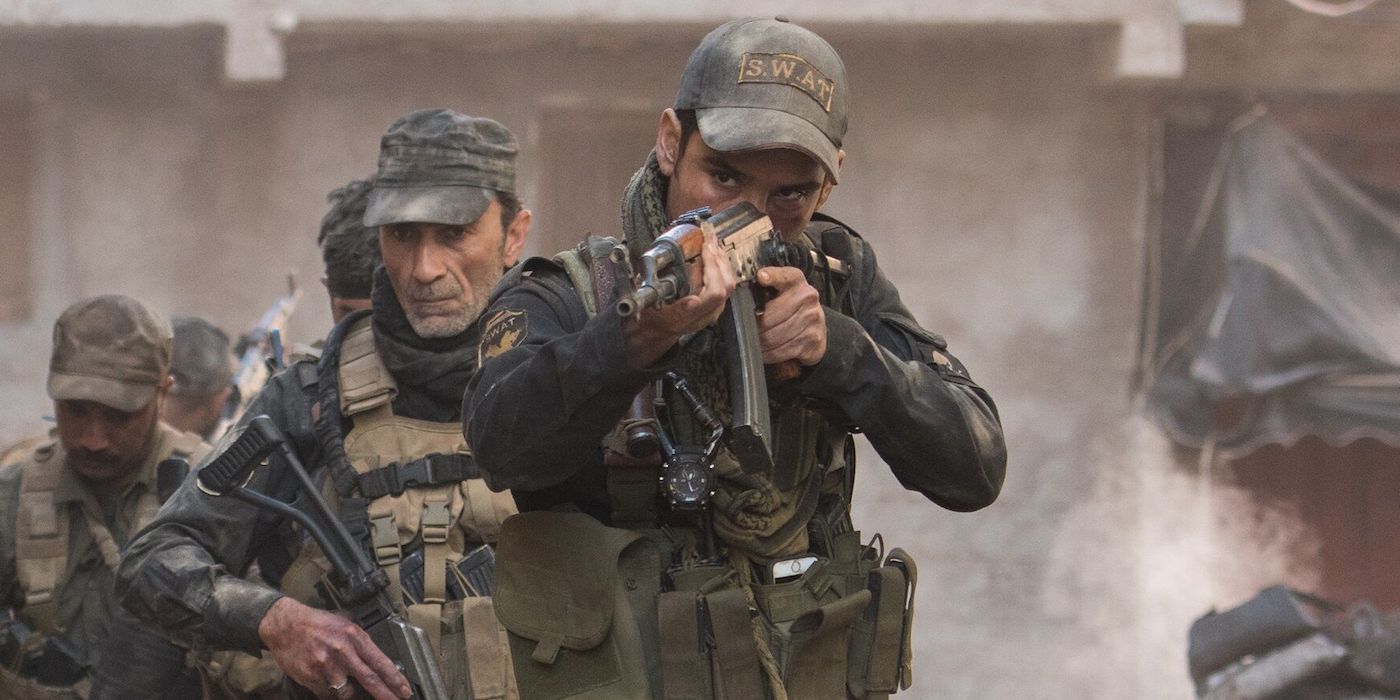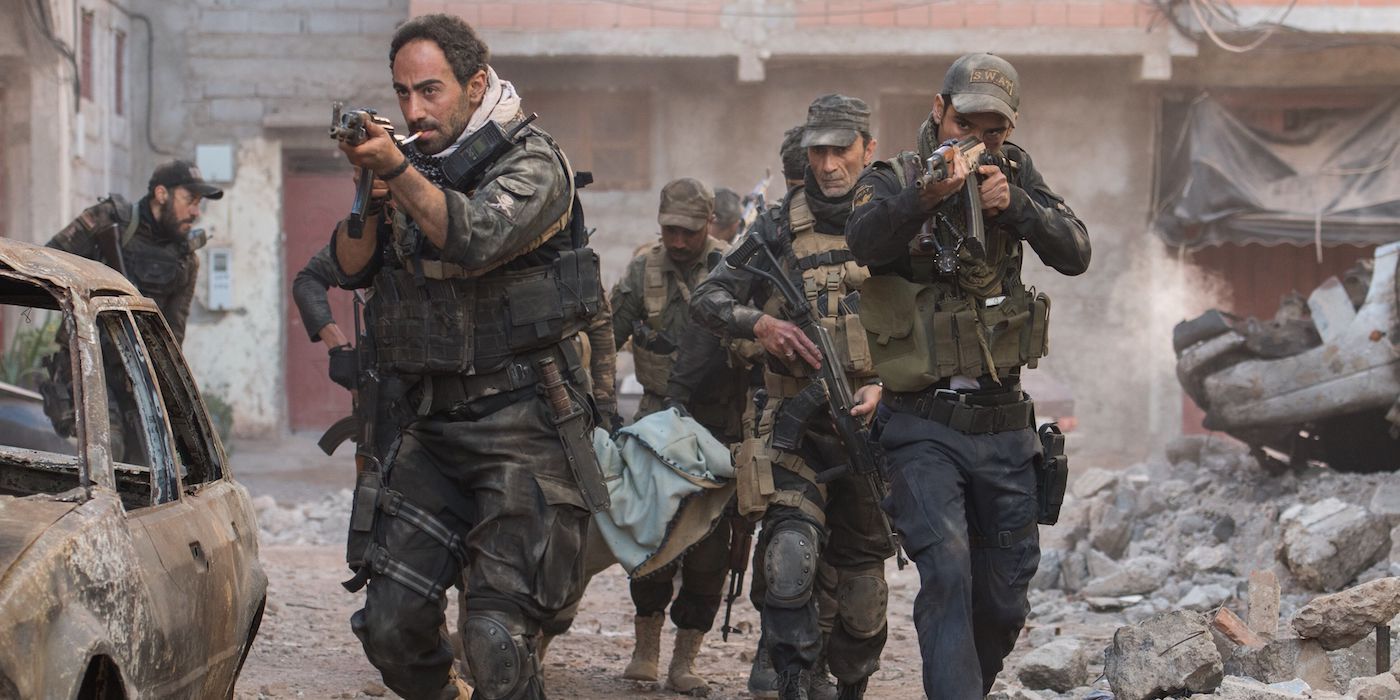Writer Matthew Michael Carnahan is no stranger to politically charged thrillers, having made his feature writing debut with 2007's The Kingdom and following up with provocative dramas like the underrated Lions for Lambs and the claustrophobic State of Play. More recently, he wrote the surprise hit, World War Z, as well as the upcoming 21 Bridges, starring Chadwick Boseman.
For his directorial debut, Carnahan is forging new ground in familiar territory: Mosul follows an elite team of cops who find themselves drawn into a life-or-death battle with ISIS over their home, the eponymous city. In contrast to most action/war films set in the Middle East, the heroes of Mosul aren't PMC interlopers or American advisors, white faces who find themselves up against an army of brown faces. This is a story about the righteous residents of Mosul who fought to protect their homes and their families from terrorists who trade in fear and death.
Produced by Avengers: Endgame directors Joe and Anthony Russo, and produced by MCU writers Christopher Markus and Stephen McFeely, Mosul boasts an impressive pedigree of blockbuster talent behind the scenes. Perhaps it's this creative supergroup of proven talent that allowed Mosul to exist as it is, a foreign-language action film with a sizeable budget and large-scale action sequences with an entirely non-white cast. While promoting the film's performance at TIFF, Carnahan spoke with Screen Rant about his work on the film, from capturing the indomitable spirit of fighters protecting something as sacred as their own land, to shooting the visceral action scenes that punctuate key moments of the movie. He also discusses his attachment to the source material, a New Yorker essay by Luke Mogelson, and his continuing efforts to get a movie off the ground with his brother, acclaimed filmmaker Joe Carnahan.
Mosul debuted at the Venice and Toronto International film festivals is currently in the process of acquiring distribution.
Screen Rant: For the Screen Rant reader who might not know about it yet, can you tell us what Mosul is about, and what makes it stand out from other action/war movies set in the Middle East?
Carnahan: It's about the Nineveh SWAT team. They were a group of cops, primarily in Mosul. They were a group of local cops who were pretty goddamned elite, and they're fighting ISIS to take back their city, to take back their homes. ISIS knew who these guys were. They knew who their families were. A lot of these guys [who] flocked to ISIS when they attacked in 2014 were the same criminals these cops had been arresting before ISIS existed. They knew who these guys were. In a lot of cases, they either killed or took their families. And this unit, they would literally rise to the sound of gunfire. They were constantly moving closer to the fight, because that's where their homes were, their lives, that's where their families still are, in some cases. That's what this story is about. It was the thing that grabbed me from Luke Mogelson's New Yorker article.
Screen Rant: And was there something in particular that drew you, personally, to the story?
Carnahan: It's embarrassing to admit in one sense, because I didn't know, having grown up in an America that's been at war with Iraq in some way, shape, or form since I was a senior in high school, I didn't fathom that these guys existed. They want the very same things I want for my hometown, my family, my children, and they're sacrificing themselves for each other to get that back. I was so blown away, and so taken with the hell these guys willingly and gladly put themselves into to get the things we have and in some cases take for granted. That's what grabbed me about it, and that's what I think your readers should know, first and foremost. Local Iraqi cops banning together to fight ISIS. The other thing you should know, too, in order to get on the SWAT team, you obviously needed to know your way around a battlefield, but you also either had to have been wounded by ISIS or lost a loved one to them in order to be admitted to the SWAT team. And most of these guys, both happened to them. They were a unit of badasses doing God's work. They did the things we hope we would do if we found ourselves in that position.
Screen Rant: In a typical Hollywood movie, there would be some fictionalized CIA guys - who would probably be super white - who would be the leads, and these guys, these actual heroes, would be supporting players in their own story. It shouldn't feel like a risk, but did it feel like a risk casting relatively unknown, brown faces to star in what looks to me like a big budget action thriller?
Carnahan: If it was a risk, Joe and Anthony never let me in on it. They were totally supportive and on board, as enamored with the challenge as I was from jump street. They allowed me to just focus on making the best possible movie I could. Never once did they bring up the budget or concerns about the cast. They just wanted the best people possible for those roles. We went to all corners of the Earth to drum [up] as much talent as we could. I think, in that respect, we did an astounding job. Once you see these guys, see them on film, any worry about acting talent goes right out the window. Once you hear them speaking some version of their mother tongue, to me, that just proves the point that these guys want the same things we all want. The things that unite us in humanity are so much more numerous and meaningful than the things that divide us. To me, to watch these guys go through this hell that they go through in the movie, to hear them tell jokes and make smart-ass comments to each other in this Baghdad dialect Arabic, it just proves the point even more. It proves it in such a salient way, for me, at least, than if they were English actors who happened to look the part who were speaking with an English accent because that's used as a stand-in for all foreign languages. That, to me, would be the bigger risk. We wanted to embrace who these guys are, the language they speak. That's the central message of the movie, that we're so much more alike than we think. Let the fact that they're from this part of the world, that they're speaking a version of their language, let that accentuate the message.
Screen Rant: It reminds me a bit... Markus and McFeely produced this movie, and they wrote all the Captain America movies, and The First Avenger has that great line of dialogue, that "the first country the Nazis invaded was their own."
Carnahan: Yes.
Screen Rant: It's like, ISIS is there, and so we can look at it from a distance and go, "everyone who is over there is brown, so they must be ISIS." But there are people fighting back within that space, but we don't hear about it.
Carnahan: Absolutely. Absolutely. And to your earlier point, the traditional version of this would be about, say, some badass Navy SEALS. I expressly didn't want that. The group we used, TigerSwan, who did our security, all of our military advising, they had trained a local Iraqi police force. So I told Sean, the man from TigerSwan who ran this three-week boot camp that I put all my actors through - and it turned out to be invaluable. It's their movement. If that action is unbelievable, then nothing else in the movie is going to work - and I told Sean, I don't want these guys at the end of this to be "tip-of-the-spear badasses." I wanted them to be what they would be in real life; really good, but not totally polished. They know how to clear a room, but they're not supposed to have that Swiss watch type of movement. They're guys who had to learn how to do this on the job. The reason they look behind the door isn't because they trained endlessly, but because they remember one time when the guy in front of them didn't look behind the door and was killed by someone who was waiting there. That was the level of action I was looking for. Brutal. Fast. These scenes explode and end before you can even really grasp what has just happened. I really wanted to dial in on that and let the action be as close to what these guys actually saw in Mosul as we could possibly make it.
Screen Rant: You're well equipped to be directing this movie! And this is the first time you've been in the hands-on position of director. You've written a lot of military-themed thrillers over the years, The Kingdom being the first, I believe, but this is your directorial debut. What was it about this project that made you feel, "I need to call the shots on this one?"
Carnahan: It's going to sound like a lame answer, but that New Yorker article grabbed me in a way that few things ever have. There's an enormous blind spot that this article exposed in me, that these guys exist, and of course these guys exist! We tend to think of Iraq in a monolithic way, "That's the enemy," because that's the way it's been portrayed for so long. But these guys exist and I was amazed by them. So I couldn't risk writing this and then that being lost. That was the first thing. I just had a part of me that wanted to be the director's chair for a while, but I hadn't been able to find that one thing that felt like, "That's the one I need to do. That's the one I can't look at myself in the mirror if I don't at least try to direct this one." That was this article. That was the thing that grabbed on to me like nothing else. I felt, if I don't write and direct this thing, I'm going to regret it until the day I die. It's too big, it's too important, it's too meaningful, personally to me, to risk handing it over and then having that central thing that grabbed me get lost or downplayed in any way.
Screen Rant: This story is all about heroism and terror and fighting for something as sacred as home. When you're doing a movie based on true events, is there any kind of disconnect during the shoot? Like, when you have downtime between takes, and there are, like, dead civilian bodies littered throughout the set, is there a feeling of, "Maybe we shouldn't be having fun right now?"
Carnahan: (Laughs)
Screen Rant: Like, is there that disconnect of, "Well, we're making a movie, this is just part of it, of course we can play around between shots," or is it super solemn? What type of tone do you strike on the set, behind the scenes?
Carnahan: It was heavy stuff, for sure. At no point was anyone unaware of what we were doing. This is where I thank Philip Ivey, our production designer. He was so goddamned fantastic and critical to the tone of the movie, because you walk onto one of his sets, and it feels like the middle of a warzone. That tells everyone, this is what we're doing. This is the world we're in. It's best not to f-ck around in this world. And the times we did lighten it up matched up to the movie. There is a scene people love, who have seen the movie, where they go into a hotel room and they're watching... Luke talks about it in the article, how these guys are obsessed with this Kuwaiti soap opera. So, any time they're in a room with a television with power, they look for this Kuwaiti soap opera. And we found the soap opera, so there's a moment where they're in this hotel room and they're riffing off these characters. And they're lighting the hookah, they're smoking, listening to Run the Jewels, because they love rap music. That's another way to show people that they like the same music. Young Iraqis love the exact same music as young Americans and young Westerners. Those moments, we were able to have fun because those were the moments they were having fun. It all depended on what we were doing on the day. When the SWAT team is trying to save these two little boys who were pushing their dead mother who was under a blanket on a cart, which was a true event, it puts tears in my eyes just thinking about it, that was really tough stuff. Beautiful and horrific... There was no joking around on the set that day, if that's not too convenient of a way to answer. To me, that's everything I've heard about warfare. These moments of sheer boredom, followed by bowel-shaking terror. That's what we tried to do in the movie. It lent itself well to it. We never got too grim, because we were always on to the next scene.
Screen Rant: While I was doing my research, my due diligence and all that...
Carnahan: (Laughs)
Screen Rant: Ya know, I'm a big fan of yours, and of your brother, Joe. I noticed that you two have never officially worked together, co-created a movie. I'm still holding out hope for Nemesis.
Carnahan: Yes. Yes.
Screen Rant: Could you talk a bit about how your processes are similar or different and why you've never been a two-brother team like, for instance, the Russos?
Carnahan: We were working on White Jazz, which was a follow-up to L.A. Confidential. It was the James Ellroy book he wrote after L.A. Confidential. We were so close. George Clooney was signed on, but it fell apart. And then Nemesis, we were so close with Fox, but that fell apart, too. We'll take a long break from one another, and if the planets align in the next cycle, then maybe next time, we'll actually bring something to screen.
Screen Rant: I hope so!
Carnahan: Joe is why I'm even in this position. He has been more confident in me that I've been in myself at various points in my life. He's the only reason I started writing, and he's the only reason I find myself on the phone with you, talking about a movie of mine that's playing in Venice and Toronto. It's only because of the doors he's kicked open for me. At some point, I'll pay him back.
Screen Rant: I think both of your work is 10 out of 10, but you're both also so different. It would be a different kind of collaboration than you'd get from a team like the Russos, where maybe you feel like they're on the same wavelength.
Carnahan: Yes. Yeah, we might murder each other. We'll have a documentary crew filming it, because that might be more interesting than the movie itself, but I think there's something great we can do together, we just have to figure out what the hell it is!

